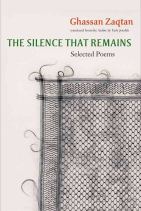7 Arabic Poetry Books Forthcoming in Translation: From Adonis to Zaqtan
There seems to have an general uptick in Arabic poetry forthcoming in English translation. These are the six (correction, SEVEN) on ArabLit’s radar:
July 2017
 The Silence That Remains, by Ghassan Zaqtan, trans. Fady Joudah (Copper Canyon)
The Silence That Remains, by Ghassan Zaqtan, trans. Fady Joudah (Copper Canyon)
Next month, you can get a copy of Zaqtan and Joudah’s bilingual, facing-page The Silence That Remains. Worth the price of admission for Joudah’s introduction alone, this big book of Zaqtan brings together work from seven different collections and reunites the Griffin Prize-winning duo.
To steal from Joudah’s introduction:
“Old Reasons, it turns out, had narrowly escaped erasure. Its publication preceded the Israeli invasion of Lebanon in 1982 by a few days. The publisher had distributed no more than a hundred copies before the rest of them burned in their boxes in the warehouse. Ghassan possessed fifteen author copies and held on to them in his apartment in Beirut. On the first day of the invasion an Israeli rocket lodged itself in the third floor, where he lived, and burned the books and everything else.”
A poem from Old Reasons, “Rain,” opens: “We have entered the language of clouds / the weather is all over / will you open your umbrella / or turn off the rain? // We only held our children’s toys in our hands”
August 2017
I Don’t Want This Poem to End, by Mahmoud Darwish, trans. Mohammad Shaheen (Interlink)
 According to the publisher:
According to the publisher:
When the Palestinian poet Mahmoud Darwish died in 2008, his friends visited his home and retrieved poems and writings some of which are gathered together in this volume, translated into English for the first time. They include three collections from different phases in Darwish’s writing career, as well as reminiscences by friends drawn from the poet’s final years, and a moving account of the discovery of the new poems in this collection. This volume includes:
- “How We Found the Poems” by Elias Khoury, a friend of Darwish and a distinguished novelist
- “My Friend Mahmoud,” a biographical memoir by Professor Mohammad Shaheen, translator of Darwish’s poetry.
- “The End of the Night,” “It’s a Song,” and “I Don’t Want this Poem to End”—three collections totaling about 80 poems, most translated into English for the first time.
- “On Exile,” a prose essay by Mahmoud Darwish.
- A letter from the poet to his brother, written in 1965 from an Israeli prison.
- “Last Meeting” by Faisal Darraj, a leading critic in the Arab world.
September 2017
A Tree Whose Name I Don’t Know, by Golan Haji, trans. Stephen Watts and Golan Haji (A Midsummer Night’s Press)
Although this will be released in September, the publisher notes that those who attend Shubbak Festival in London can get a copy early.

Fall 2017
Adrenaline, by Gayath al-Madhoun, trans. Catherine Cobham (Action Books)
No cover currently available, but you can read two of the poems over on The Guardian.
December 2017
Arabian Satire: Poetry from 18th Century Najd, by Hmedan al-Shwe’ir, ed. and trans. by Marcel Kurpershoek (NYU Press)
 From the publisher:
From the publisher:
This lively volume collects key poems by the 18th-century poet, Hmedan al-Shwe’ir, who lived in the Najd region of the Arabian Peninsula shortly before the hegemony of the Wahhabi movement. A master of satire known for his ribald humor, self-deprecation, and invective verse (hija), Hmedan was acerbic in his criticisms of society and its morals, which he voiced in a poetic idiom widely referred to as “Nabati,” here a mix of Najdi vernacular and vocabulary and images dating back to the origins of Arabic poetry. In his poetry Hmedan is mostly concerned with worldly matters, and addresses these in different guises: as the patriarch at the helm of the family boat and its unruly crew; as a picaresque anti-hero who revels in taking pot shots at the established order, its hypocrisy, and its moral failings; as a peasant who labors over his palm trees, often to no avail and with no guarantee of success; and as a poet recording in verse how he thinks things ought to be.
The poems in Arabian Satire reveal a plucky, headstrong, yet intensely socially committed figure—representative of the traditional Najdi ethos—who infuses his verse with proverbs, maxims, and words of wisdom expressed plainly and conversationally. Although frequently quoted by Najdi historians and in anthologies of popular sayings, this is the first full translation of Hmedan’s collected poetry (diwan).
January 2018
 Concerto al-Quds, by Adonis, trans. Khaled Mattawa (Yale University Press)
Concerto al-Quds, by Adonis, trans. Khaled Mattawa (Yale University Press)
From the publisher:
At the age of eighty-six, Adonis, a Syrian poet, critic, essayist, and devoted secularist, has come out of retirement to pen an extended, innovative poem on Jerusalem/Al-Quds. It is a hymn to a troubled city embattled by the conflicting demands of Jews, Christians, and Muslims.
Adonis’s city, as a coveted land, ought to suggest the universal love of humanity; as a land of tragedy, a place of contending history and beliefs, and a locus of bitterness, conflict, hatred, rivalry, and blood. Wrapping multiple voices, historical references, and political viewpoints within his ecstatic lyricism, Adonis has created a provocative work of unique beauty and profound wisdom, beautifully rendered in English by award-winning poet Khaled Mattawa.
Also 2018
Until We Give Up the Idea of Houses, by Iman Mersal, trans. Robyn Creswell
No cover currently available, but you can read a poem from the collection translated by Creswell on The Nation.

June 26, 2017 @ 7:01 pm
Reblogged this on World4Justice : NOW! Lobby Forum..